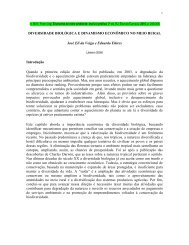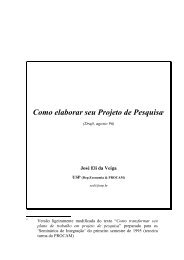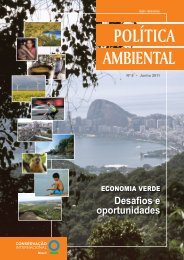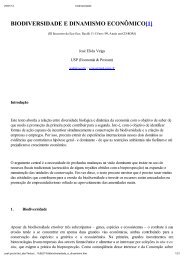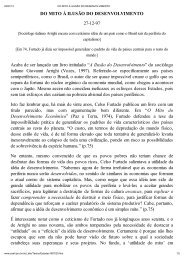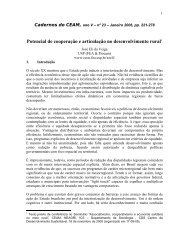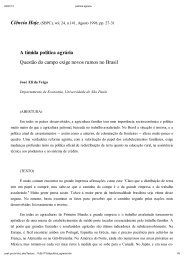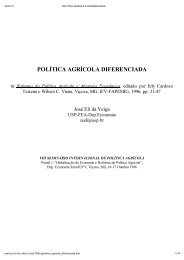sustainable development 20 years on from the ... - José Eli da Veiga
sustainable development 20 years on from the ... - José Eli da Veiga
sustainable development 20 years on from the ... - José Eli da Veiga
You also want an ePaper? Increase the reach of your titles
YUMPU automatically turns print PDFs into web optimized ePapers that Google loves.
97<br />
Box II.1<br />
LATIN AMERICA AND THE CARIBBEAN IN INTERNATIONAL AND REGIONAL FORUMS<br />
ON THE ENVIRONMENT AND SUSTAINABLE DEVELOPMENT<br />
United Nati<strong>on</strong>s Commissi<strong>on</strong> <strong>on</strong> Sustainable Development (CSD): Latin American and Caribbean countries have<br />
participated actively in CSD since its establishment in 1992. At its thirtieth sessi<strong>on</strong> held in San Juan in <str<strong>on</strong>g>20</str<strong>on</strong>g>04, <strong>the</strong><br />
Ec<strong>on</strong>omic Commissi<strong>on</strong> for Latin America and <strong>the</strong> Caribbean (ECLAC) decided to create a Regi<strong>on</strong>al Implementati<strong>on</strong><br />
Forum <strong>on</strong> Sustainable Development feeding into <strong>the</strong> two-year cycle of CSD Meetings <strong>on</strong> Regi<strong>on</strong>al Implementati<strong>on</strong><br />
of <strong>the</strong> Johannesburg Summit, pursuant to <strong>the</strong> Summit man<strong>da</strong>te to <strong>the</strong> Regi<strong>on</strong>al Commissi<strong>on</strong>s. a<br />
Forum of Ministers of <strong>the</strong> Envir<strong>on</strong>ment of Latin America and <strong>the</strong> Caribbean: Established in 1982 under <strong>the</strong><br />
Secretariat of <strong>the</strong> United Nati<strong>on</strong>s Envir<strong>on</strong>ment Programme (UNEP), <strong>the</strong> Forum brings toge<strong>the</strong>r <strong>the</strong> regi<strong>on</strong>’s 33<br />
envir<strong>on</strong>ment ministers or equivalent and heads of envir<strong>on</strong>ment agencies or committees, who meet regularly to agree<br />
joint positi<strong>on</strong>s before global organizati<strong>on</strong>s and to c<strong>on</strong>clude regi<strong>on</strong>al cooperati<strong>on</strong> agreements. The Forum has a<br />
regi<strong>on</strong>al acti<strong>on</strong> plan that serves as an important cooperati<strong>on</strong> platform.<br />
Latin American and Caribbean Initiative for Sustainable Development (ILAC): ILAC was adopted in <str<strong>on</strong>g>20</str<strong>on</strong>g>02 by<br />
<strong>the</strong> Governments of Latin America and <strong>the</strong> Caribbean within <strong>the</strong> framework of <strong>the</strong> World Summit <strong>on</strong> Sustainable<br />
Development in Johannesburg. Its main objective is to assess progress and take effective acti<strong>on</strong> towards <str<strong>on</strong>g>sustainable</str<strong>on</strong>g><br />
<str<strong>on</strong>g>development</str<strong>on</strong>g> in countries of <strong>the</strong> regi<strong>on</strong>. In <str<strong>on</strong>g>20</str<strong>on</strong>g>03, <strong>the</strong> Forum decided to support a project for producing nati<strong>on</strong>al<br />
envir<strong>on</strong>mental indicators, as well as any ec<strong>on</strong>omic, social and instituti<strong>on</strong>al indicators required to assess progress in<br />
implementing ILAC.<br />
Meeting of Ministers and High-level Authorities of <strong>the</strong> Housing and Urban Development Sector in Latin<br />
America and <strong>the</strong> Caribbean (MINURVI): MINURVI is <strong>the</strong> main entity facilitating intergovernmental<br />
coordinati<strong>on</strong> and cooperati<strong>on</strong> am<strong>on</strong>g <strong>the</strong> countries of Latin America and <strong>the</strong> Caribbean in <strong>the</strong> area of <str<strong>on</strong>g>sustainable</str<strong>on</strong>g><br />
<str<strong>on</strong>g>development</str<strong>on</strong>g> of human settlements. It has prioritized improving <strong>the</strong> urban envir<strong>on</strong>ment and reducing envir<strong>on</strong>mental<br />
vulnerability as a key focus of its work. At its most recent meeting held in Asunción in September <str<strong>on</strong>g>20</str<strong>on</strong>g>11, MINURVI<br />
agreed to promote <strong>the</strong> <str<strong>on</strong>g>development</str<strong>on</strong>g> of territorial <str<strong>on</strong>g>sustainable</str<strong>on</strong>g> <str<strong>on</strong>g>development</str<strong>on</strong>g> policies with a view to creating synergies<br />
am<strong>on</strong>g <strong>the</strong> envir<strong>on</strong>mental, ec<strong>on</strong>omic and social aspects and highlighting <strong>the</strong> envir<strong>on</strong>mental and social costs. It also<br />
agreed to appoint Argentina as Permanent Technical Secretariat with technical support and coordinati<strong>on</strong> provided by<br />
ECLAC and <strong>the</strong> United Nati<strong>on</strong>s Human Settlements Programme (UN-HABITAT).<br />
Central American Commissi<strong>on</strong> <strong>on</strong> Envir<strong>on</strong>ment and Development (CCAD): Established in 1989 as part of <strong>the</strong><br />
Central American Integrati<strong>on</strong> System (SICA), it has acquired great importance as a subregi<strong>on</strong>al forum for<br />
envir<strong>on</strong>ment ministers or equivalent authorities. Based <strong>on</strong> joint positi<strong>on</strong>s, a series of agreements for <strong>the</strong> subregi<strong>on</strong><br />
were proposed in such areas as biological diversity, hazardous waste and forests, which are accompanied by a<br />
portfolio of envir<strong>on</strong>mental projects and a successful financial strategy.<br />
Sou<strong>the</strong>rn Comm<strong>on</strong> Market (MERCOSUR): Established in 1991 by Argentina, Brazil, Paraguay and Uruguay to<br />
promote <strong>the</strong> integrati<strong>on</strong> of <strong>the</strong> States Parties, since 1996 it has included a subworking group <strong>on</strong> envir<strong>on</strong>ment. It<br />
adopted a Framework Agreement <strong>on</strong> <strong>the</strong> Envir<strong>on</strong>ment with a corresp<strong>on</strong>ding acti<strong>on</strong> plan, as well as cooperati<strong>on</strong><br />
initiatives <strong>on</strong> specific issues.<br />
Caribbean Community (CARICOM): CARICOM was established in 1973 to stimulate ec<strong>on</strong>omic cooperati<strong>on</strong> within<br />
<strong>the</strong> Caribbean comm<strong>on</strong> market, forge closer political and ec<strong>on</strong>omic relati<strong>on</strong>s between Member States and promote<br />
educati<strong>on</strong>al, cultural and industrial cooperati<strong>on</strong> between CARICOM countries. Since its establishment, CARICOM has<br />
led projects in such areas as renewable energy <str<strong>on</strong>g>development</str<strong>on</strong>g>, climate change a<strong>da</strong>ptati<strong>on</strong> and food safety.<br />
Associati<strong>on</strong> of Caribbean States (ACS): The C<strong>on</strong>venti<strong>on</strong> establishing ACS was signed <strong>on</strong> 24 July 1994 in Cartagena,<br />
Colombia, with <strong>the</strong> aim of promoting c<strong>on</strong>sultati<strong>on</strong>, cooperati<strong>on</strong> and c<strong>on</strong>certed acti<strong>on</strong> am<strong>on</strong>g all <strong>the</strong> countries of <strong>the</strong><br />
Caribbean. It comprises 25 Member States and three Associate Members. Eight o<strong>the</strong>r n<strong>on</strong>-independent Caribbean<br />
countries are eligible for associate membership. There are five special committees <strong>on</strong> trade <str<strong>on</strong>g>development</str<strong>on</strong>g> and external<br />
ec<strong>on</strong>omic relati<strong>on</strong>s; <str<strong>on</strong>g>sustainable</str<strong>on</strong>g> tourism; transport; natural disasters; and budget and administrati<strong>on</strong>.<br />
Andean Community: In 1999 it approved <strong>the</strong> establishment of <strong>the</strong> Andean Committee of Envir<strong>on</strong>mental<br />
Authorities, as a forum for dialogue and c<strong>on</strong>sensus-building <strong>on</strong> <strong>the</strong> envir<strong>on</strong>ment.



